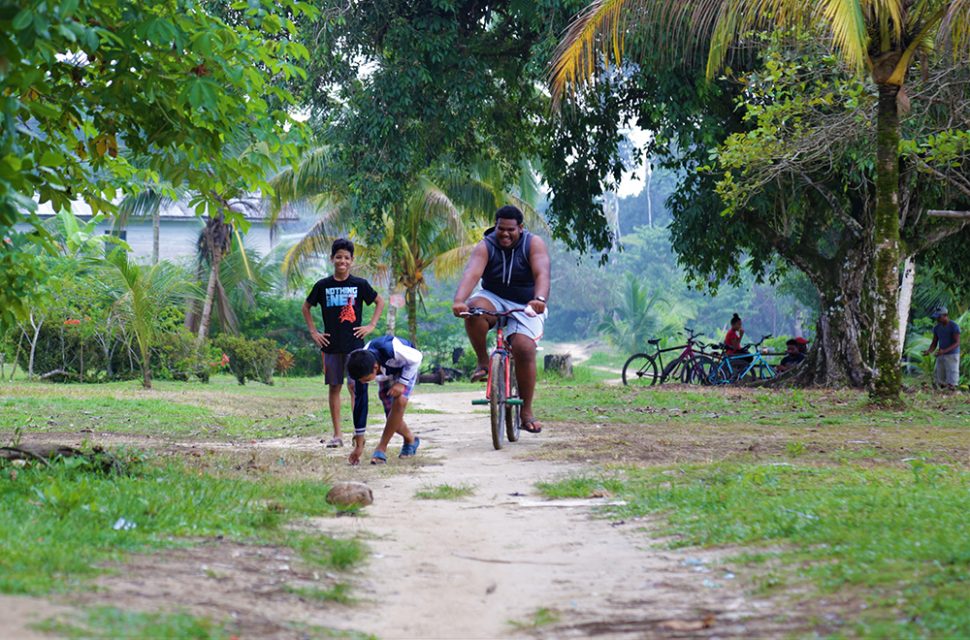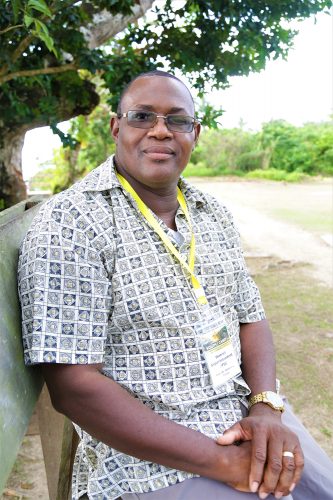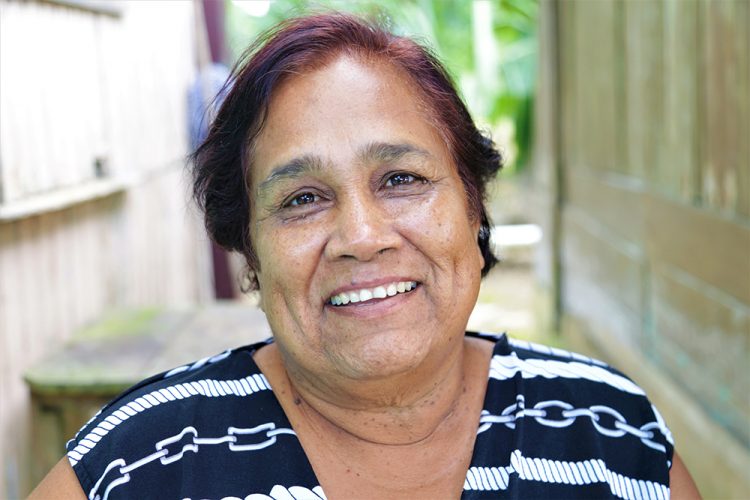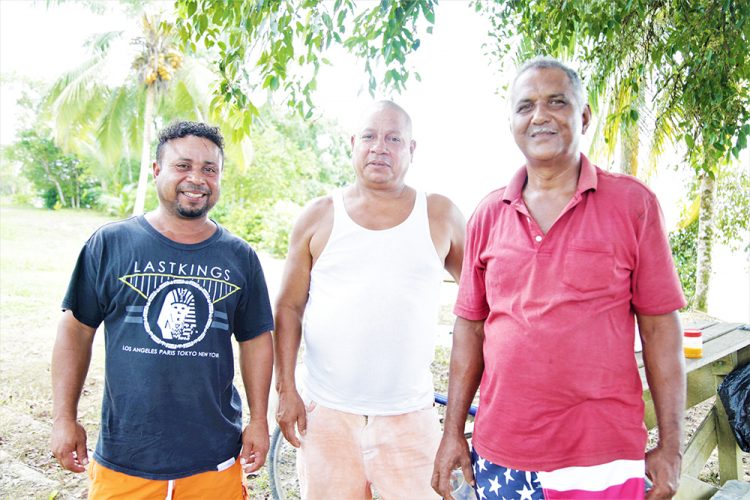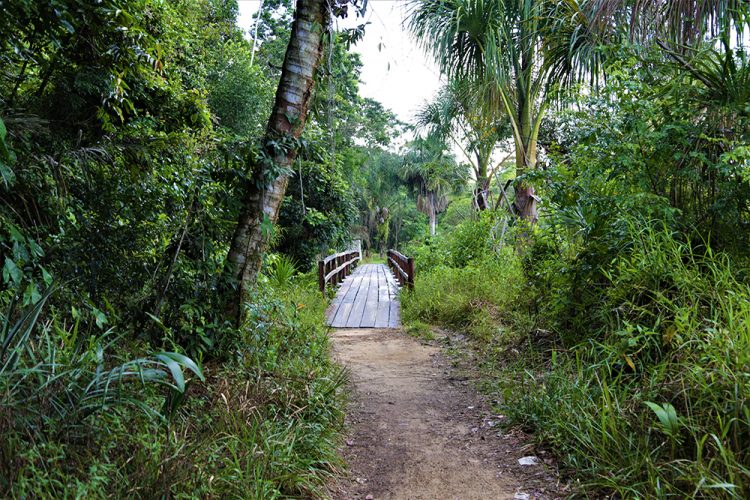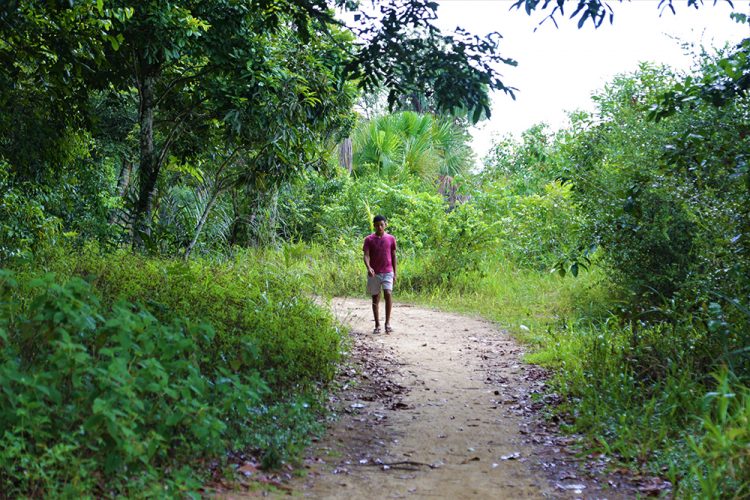Last week in the World Beyond Georgetown, I began to explore Goshen, mostly through the eyes of ‘Auntie’ Carmen Williams. This week, I wrap up my exploration.
Not far from Auntie Carmen’s place, the peculiar sight of a tiger fish squeezed in the fork of a tree caught my attention. Its owner was one of Auntie Carmen’s sons. He had just finished weeding and decided to get cleaned up in the river when he saw and caught the striped creature. It was still alive when he stuck it in the tree and went back to bathe, by the time he had finished, it had died and he collected it looking forward to a delicious meal.
I rounded the bend and came across a boy pushing his baby brother in a stroller. We were all headed to Lynette Singh’s shop. Her son is the shopkeeper, but she assists sometimes, she said.
“I’m from Bonasika then I married and came up here to live,” Singh said. Her late husband, also from Bonasika Creek, had gone to Goshen through the church camp. He stayed as the caretaker for the campsite for five years, before returning to Bonasika, where he married Lynette; they decided to settle in Goshen.
The woman said she likes not having to deal with mud like in Bonasika, and not getting dirty when it rains, though Bonasika has more fertile land for farming. She likes that Goshen is only minutes away from Bartica where many services are available. “At first it was hard for me coming here and being so far away from my family but then I understand that I get married and I needed to live with my husband,” Singh said. “Adjusting was difficult but with every passing day things got easier for me. It was strange at first with the people. Where I’m from was Indians and here it’s mixed, mostly Amerindians. They were nice to me and was already accustomed to my husband since he lived here before.”
Singh’s residence is favoured by the children. Out front are a trampoline and swings, which they can use for a fee. Business booms a bit more during church camps. Stock for Singh’s shop is purchased at Bartica and though the prices are higher than at Parika or Georgetown, the distance makes it cheaper in the long run. Singh sells 2 eggs for $100, a 1-litre soda for $400 and a Thrill soft drink for $160; it costs $180 on the Bartica ferry.
“I like living here; it’s peaceful. Only like snakes, and [jaguars] would come far apart and catch the chickens and dogs but not to trouble anybody. It got the chicken hawks that would come and carry away the baby chicks and ducklings at the back,” she said.
The children do not laze away their days. They are always caught up in activities, like chink, a game of marbles named for the sound made when marbles hit each other. Other children could be seen working on their paddling skills on the river, happy for the holiday break. Those who attend nursery and primary schools walk two miles to the nearest schools in River’s View. A fortunate few have bicycles.
Speaking about the river, Singh recalled that at one point they were unable to use the water because it had been contaminated with cyanide from mining concessions. During that period, she said, everyone depended on the rain. But she added that the river water is now relatively safe.
Patrolling jaguars
Ray Gounga and brothers Marlon and Leon Richardson sat on some logs under a tree taking a drink to celebrate Marlon’s 46th birthday and talking about the happenings in the village.
“From what I hear,” Leon Richardson said, “Goshen was one of the main landings for logging. It had ships used to come out here and moor and take off these logs from here. They say that logging here begin before anybody really started living here. I don’t know how long back all of this used to happen, but the village was existing a long time. My grandmother born here. My father born here too. He died last year at the age of 79. He and Auntie Carmen carry same age. Auntie Carmen used to live right here. She and he grow like brother and sister.”
According to him, the first school was one run by the Seventh Day Adventists, which he attended. He noted that there was also the Holy Name Anglican School.
“It was nice here back in the days. I had a good time, but I leave school at an early age, at 14 years, and start working in the interior,” he added.
He said he has never had an encounter with a jaguar but has seen them more times than he can count. “After I move to another part and clear the bushes, a lot of tigers [jaguars] used to pass around, small ones. We just watch them pass and gone. They would come and carry away the dogs,” Leon said.
Gounga said he lost three of his dogs to the big cats. “I don’t know if it’s the reason we are hunting them that they are coming back for the dogs,” he mumbled and the Richardsons laughed, saying “the world is round.”
Gounga, a carpenter and licensed firearm holder, often goes hunting, but not for jaguars, he said, only for
animals he can use for food: deer, labba, wild cow, wild hog and the like. Gounga sells any excess meat to the other villagers.
According to Marlon Richardson: “They [jaguars] patrolling this road here, eating dogs from end to end during the dry season. One, one time people would shoot them. The fattest dog they does look for. They are jaguars though. I don’t think we got the kind of Amerindians here to turn Kanaima.” The men laughed. According to folklore, Kanaima are evil spirits or shape-shifting Amerindians who can turn into animals, including jaguars.
On a more serious note, Leon noted that curfews used to be put in place when these animals roamed the villages and people went to church with lamps on their heads or flambeaux in their hands. This was not so long ago, less than ten years ago, he said.
‘I supposed to live’
Marlon confessed to having had more adventures than his brother. “I pass through a lot of things,” he said,
indicating scars on his forehead and foot. “When I was one year, six months I get this. Me father used to drive truck at Skull Point. Me mother said, ‘hear you father coming’. The house was like three feet off the ground. I gone to the window peeping fuh me ole man and I fall out the window on a bottle and bust me head.
“When I was five years, I get snake bite. It was the morbana snake. It is a real deadly snake. I spend one month in the hospital then my father thief me from Bartica Hospital to carry me to Georgetown Hospital with plane. Then he had to thief me from Georgetown Hospital to bring me home to a bush doctor. The foot eat away from the bite. That’s how I leff with this mark. One month after this get better, stingray jook me on me backside.”
At his last remark, the men broke into fits of laughter.
Later on, Marlon was bitten by a dog and also fractured an arm and a leg, which required steel in both places. He also broke three of his toes while doing logging. “So, I supposed to live,” he said with certainty, bursting out laughing again.
Aside from logging and mining at one time, Marlon also piloted a passenger boat. The cost was $500 per person from Goshen to Bartica. To hire the entire boat to the town was $5,000. Schoolchildren no longer pay as the Ministry of Education covers the cost. The man said when he worked as boat captain, sometimes he would wait for 3 to 6 months for the ministry to pay the schoolchildren’s fares.
Parents, knowing his plight, decided to pay $300, return fare for each child so as to help Marlon since he has a family of his own to take care of. Marlon added that all of the parents could not afford it and when the children arrived in Bartica, they still needed money for the buses that would take them to school.
He said he went back and forth to Georgetown to collect his pay, often returning home empty-handed. His wife worked at the health centre in River’s View, but they could not manage on her meagre salary. They had four school-aged children and kept a kitchen garden to provide for some of their needs. Marlon eventually left the job.
According to Leon, things can get really expensive living in the country and he did not realize how much he actually paid for items until he visited relatives on the East Coast Demerara and was able to compare prices. Transportation costs are high and so is generator fuel, but Leon would not trade his life at Goshen for any other. “I’m just comfortable here,” he added. “What I can do here I can’t do that side. When you live that side, it’s just a 60 by something lot. You put up your house and you ain’t got nowhere to plant your garden. You might jook a pepper or two and that’s all. Cost of living cheap yes, but still. I like that side there for better education for my children but having the opportunity to do more planting is what I like about here. I want us to have better road, better sea defence, electricity and [potable] water.”
Reverend Alphonso Porter, of the Church of the Nazarene in Guyana, is a frequent reader of the World Beyond Georgetown and was happy to speak. He was walking around watching the tide come in, while the campers were attending a session in a building. “I am 52 now and I’ve been coming to the camp since I was 14 years old. We’ve been having camp before that. Our campsite is a bit further down and is in disrepair now, so we are camping on the Baptist Church campsite. Many of our youths usually camp on the Linden/Soesdyke Highway. Parents prefer us to camp there as it’s closer and they don’t have to worry about a river. That’s means when we come here, all of our safety rules kick in, but it’s a new experience for them.
“We have 143 youths at camp; it’s for persons 12 and up but we have 5 11-year olds. We have four mothers who have come with their daughters to camp. We teach them a wide range of skills: social skills, etiquette, to wash the dishes, clean and decorate their dormitories, tying knots, but of course we strongly emphasize on their spiritual connection with God. We have medical personnel on staff, a soldier from the Guyana Defence Force who would take them on the trails and so forth.
“Once this session breaks, the children will be out here, some sitting and taking in the view. I ask them what is it you’re seeing and they would say, ‘oh, we don’t get to see this’. I don’t know what they get out of it but what I get out of it is the tranquility and just the different atmosphere from Georgetown.
“The people in the community are usually courteous and friendly. Over the years I’ve been coming here I’ve established some friendships and they would come over and bust coconuts for us and tell us where the different fruit trees are and where we can go.”
He said Goshen was where he learned to swim during a camping trip. He added that boundaries are in place for the children going into the river and a lifeguard is always present.

